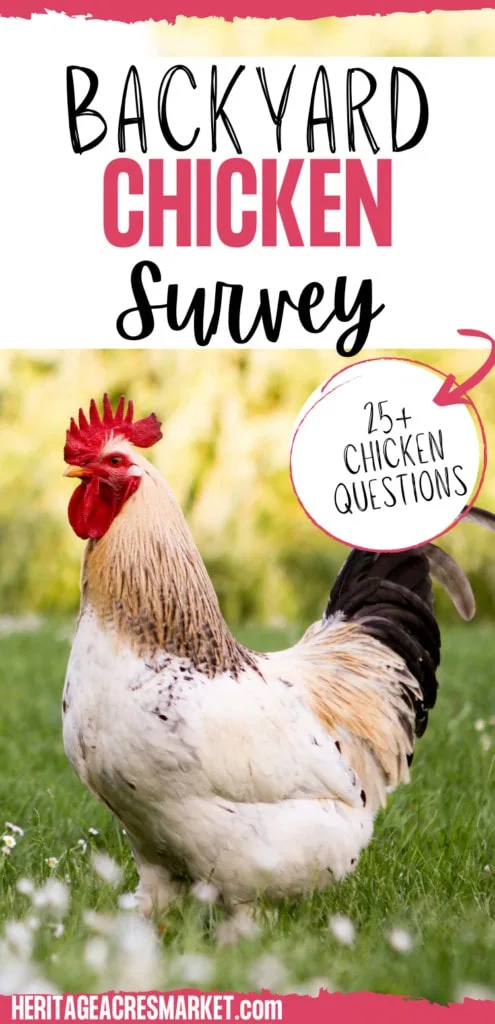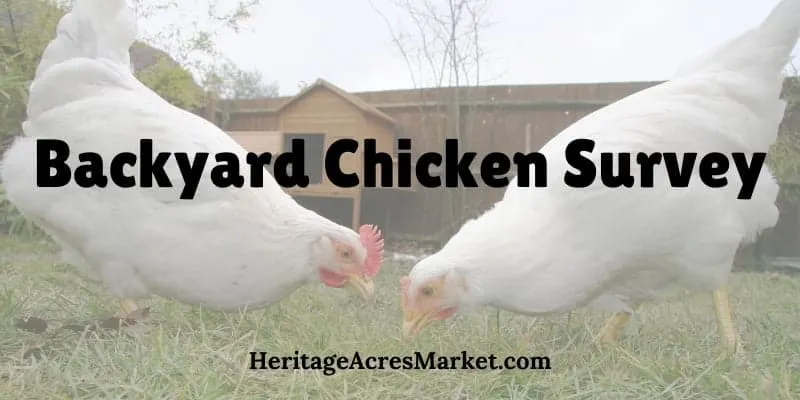
As backyard chicken keeping continues to grow in popularity, a survey by Heritage Acres Market wanted to find out why people decided to get chickens and learn more about how they care for their flock.
In this backyard chicken survey, we asked nearly 3000 backyard chicken owners about their flocks, chicken keeping habits, and other interests. What we learned from this survey was really interesting.
Table of Contents
Top Findings
- 58% of flock either have or plan to have a rooster
- Blue is the favorite egg color
- Hawks are the most common chicken predator
- Easter Eggers are the most popular breed
- 79% of chicken coops are not heated in the winter
- Most people purchased chickens to have fresh eggs
- The most common chicken issue is pooping in nest boxes
It is probably safe to assume that most backyard chicken owners are curious about the survey results.
It can be really discouraging when you find a chicken with lice or mites. But when finding out that this is a common problem, it makes us feel better.
Or maybe you are trying to decide whether or not you should heat your chicken coop and want to know what other chicken keepers do.
This backyard chicken survey was a really fun and insightful project, and hopefully, you’ll find the results interesting as well.
How The Survey Was Conducted
From January 16, 2021- January 26, 2021, we shared the Backyard Chicken Survey (created with Google Forms) across several platforms to reach a broad audience.
Survey Requests
Backyard Chicken Survey requests were posted on Facebook, Instagram, BackyardChickens.com, Reddit, Quora, Gab, and Twitter. Requests were also sent out via Heritage Acres Market’s email newsletter and text messaging community.
Bias
The survey was presented in a way to try and eliminate bias. Questions were worded in a neutral tone and delivered in random order. Most answer selections were also set to shuffle the order in which they were presented.
While it is not possible to include every possible answer to a question in multiple-choice format, we tried to include the most common answer choices.
The majority of the backyard chicken survey requests were distributed in a method that did not initially correlate the survey with Heritage Acres Market. However, the survey request was also sent out via email and social media, which only accounted for a small portion of the responses.
Some bias may be present due to the Facebook group demographics that the survey was posted to. For example, Colorado was one of the highest participant states because the survey was shared with a Colorado Chickens Facebook group (Heritage Acres Market is a Colorado business).
The backyard chicken survey was also shared with a Silkie Chicken and an Easter Egger Facebook group. However, based on comments, those groups appeared to have fewer survey participants than the other generic chicken groups.
Qualified Results
A total of 2999 responses qualified for the survey. Those that did not currently have chickens were removed, as the survey questions were only intended for those that have chickens now.
Added And Optional Questions
A few questions were either optional or added after the survey was opened. These questions will not have the total 2999 responses.
Final numbers
The final numbers displayed in this post are rounded to the nearest whole number for simplicity. That said, some results may total 101%, but including parts of percent seemed trivial.
Infographic
Click the infographic to zoom in and view it full size.
Survey Results
Here are all of the questions and responses from our Backyard Chicken survey.
What is your gender identity?
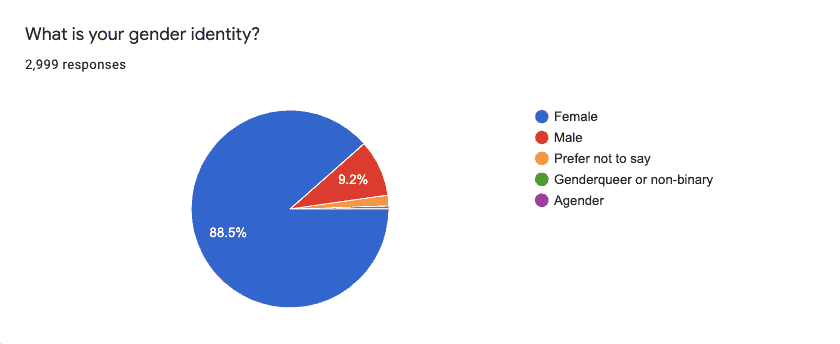
What is your age?
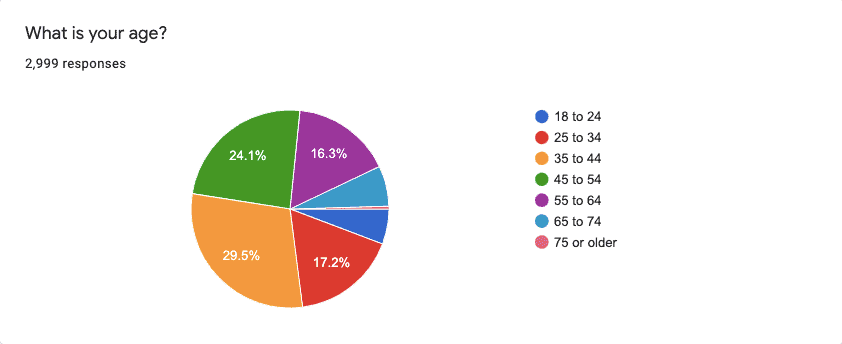
What type of area do you live in?
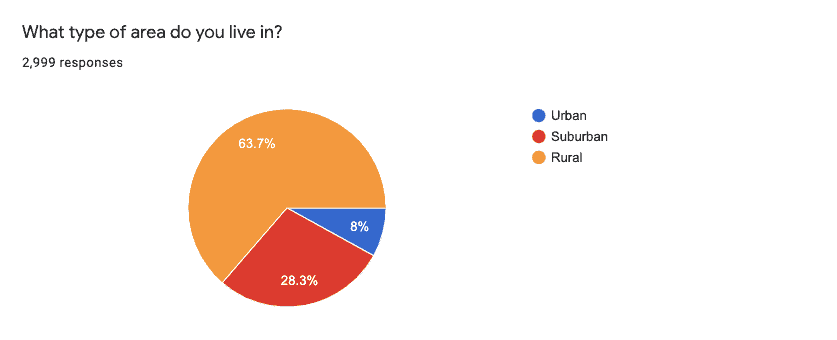
Do you have a Home Owners Association, covenants, or other regulations that limit how many chickens you may own?
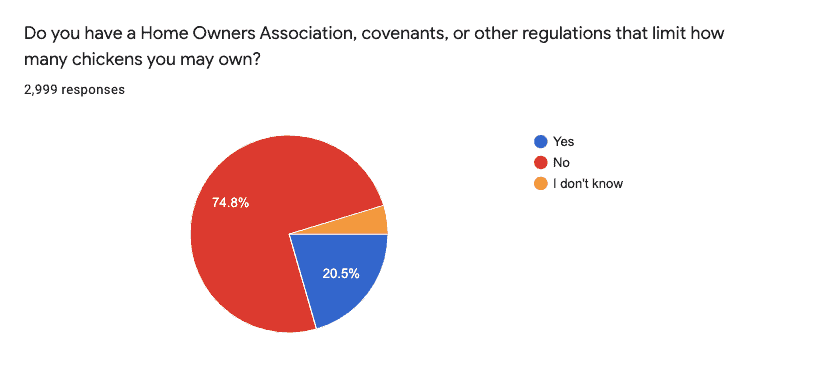
How many children live in your household (aged 17 or younger only)?
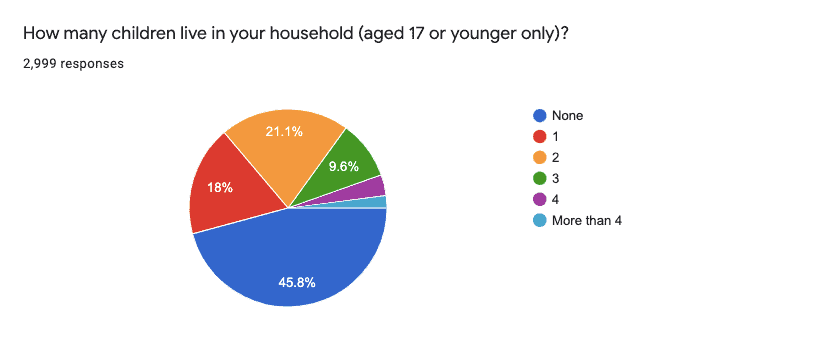
Do you listen to podcasts?
If you like podcasts and chickens, you’ll love our Backyard Bounty podcast!
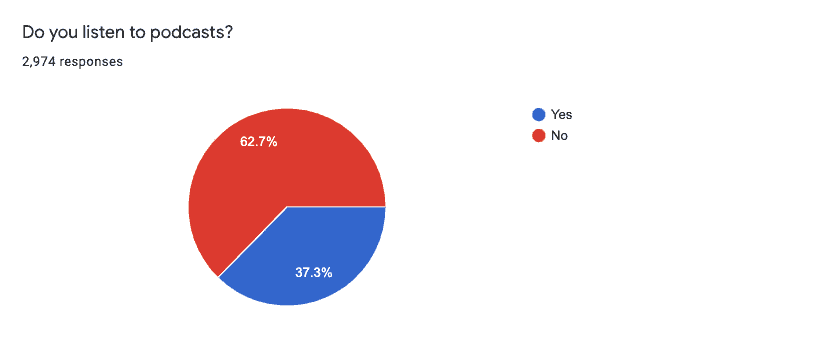
What social media platforms do you use?
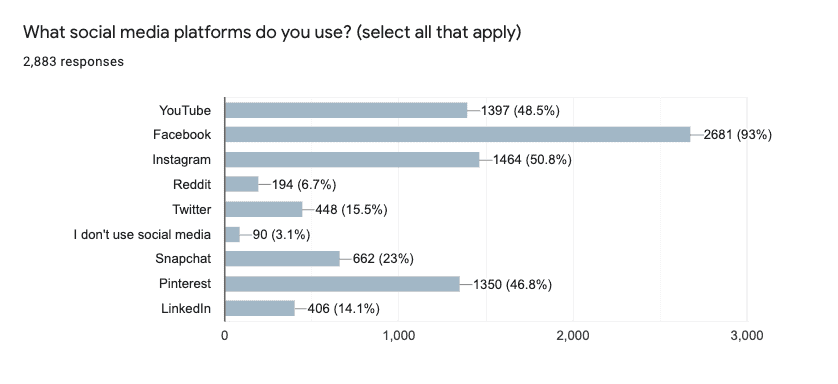
What are some of your other hobbies/interests?
Admittedly, we were not going to include the “other interests” question in the backyard chicken survey but decided to add it last minute. This was more of a general curiosity question, and it was entertaining to learn what other interests the backyard chicken community has.
An incredible 71% of participants also enjoy gardening.
56% enjoy cooking, and 59% find joy in family time.
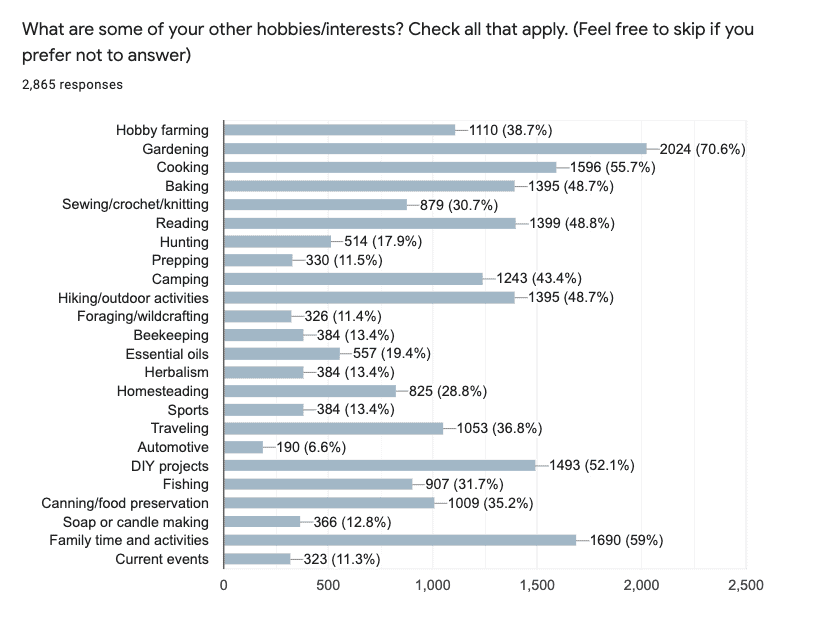
Do you currently have or plan to add any of the following in the next year?
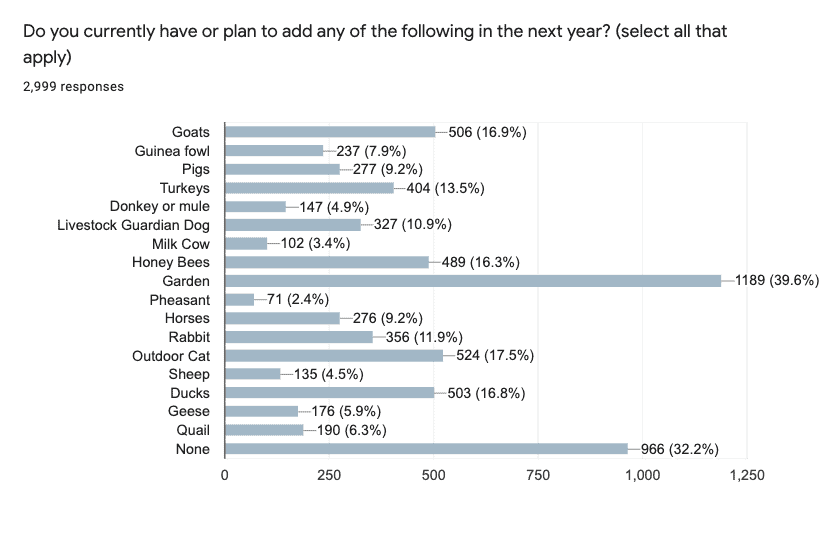
How long have you had chickens?
One of the things that we wanted to learn with this backyard chicken survey is how many new chicken owners purchased chickens within the last year. With the pandemic, food security concerns, and civil unrest, it seems that more people are interested in being self-sufficient.
29% of participants have had chickens for less than one year.
This is almost equal to the 34% of participants who have had chickens for 5+ years and more than folks that have had chickens for 1-2 or 2-4 years.
This clearly shows that the number of new chicken owners is significantly higher this year than in previous years.
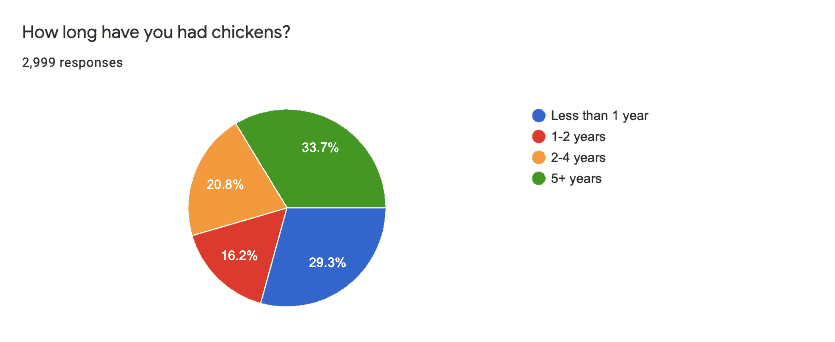
Why did you decide to get chickens originally?
With the obvious increase in new chicken owners, the obvious question is WHY did you decide to get chickens? What was the reason you wanted to add chickens to your backyard?
Interestingly, only 10% stated that their interest in purchasing chickens was due to the Covid-19 pandemic.
The majority of new chicken owners purchased chickens to have fresh eggs.
Other popular reasons were to add chickens to a homestead/hobby farm and to teach children animal husbandry or responsibility.
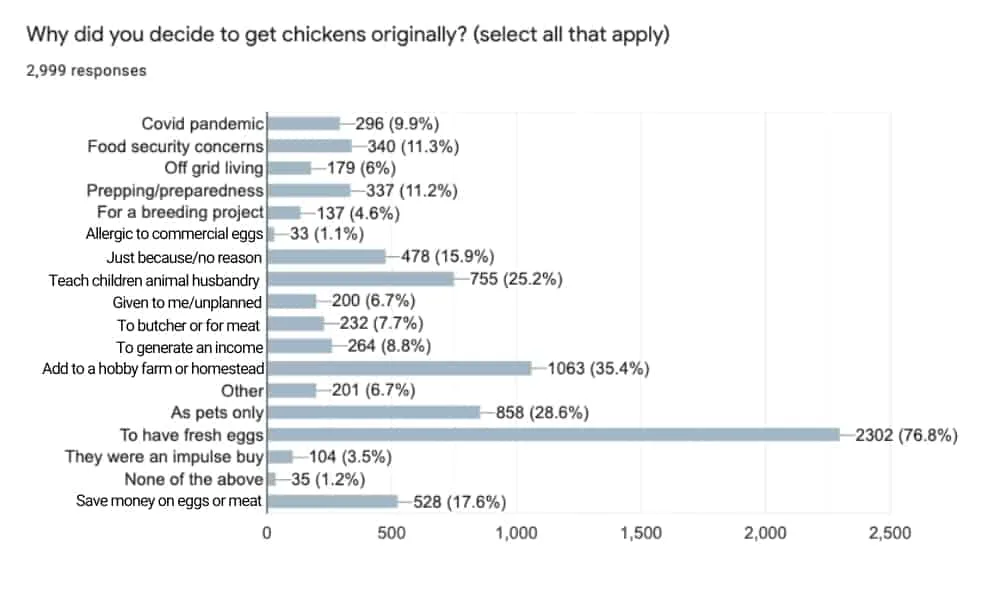
How many chickens do you currently have?
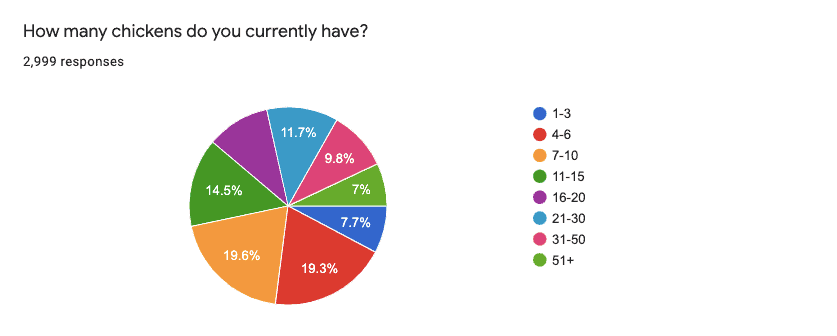
Do you have a mature (crowing) rooster in your flock?
The majority of chicken flocks (58%) either have or plan to have a rooster, while 42% do not.
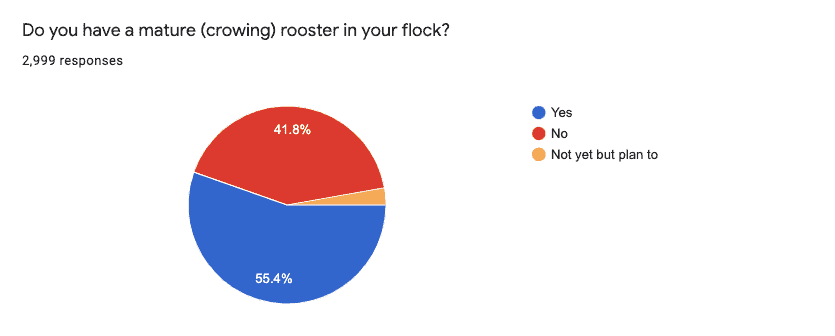
What breed(s) of chickens do you currently own?
Easter Eggers was the clear winner here, with 51% of participants having them. Other popular breeds were Orpingtons (39%), Rhode Island Red (39%), Wyandottes (34%), and Barred Rock (36%).
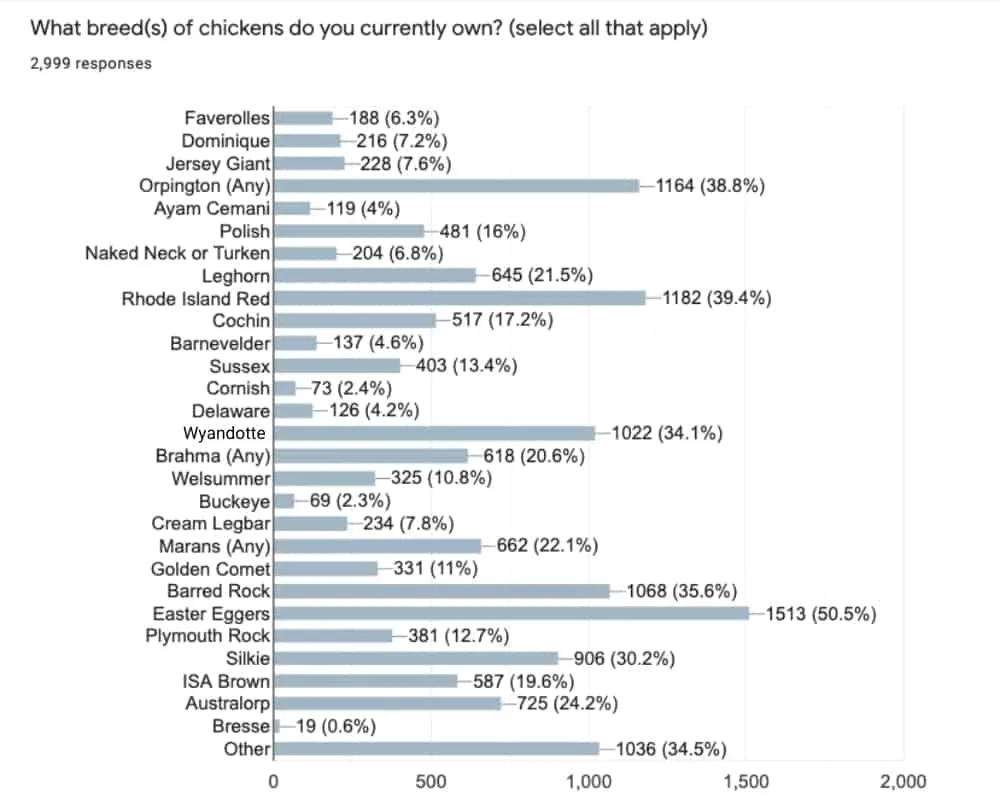
Do your chickens have names?
A whopping 86% of participants name their chickens.
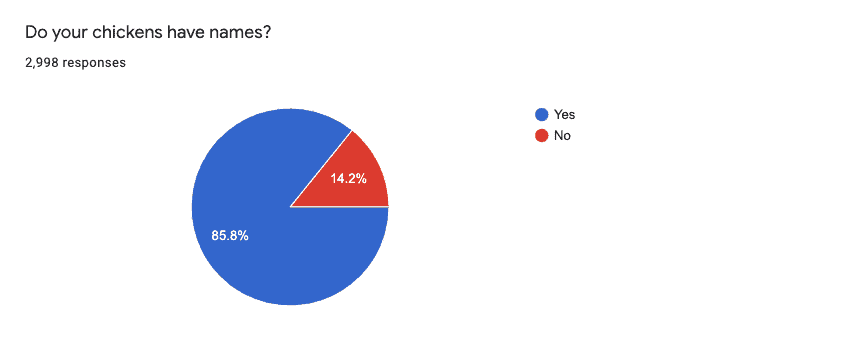
What is your favorite egg color?
41% of participants don’t have an egg color preference, while those who did chose Blue eggs (27%) as their favorite.
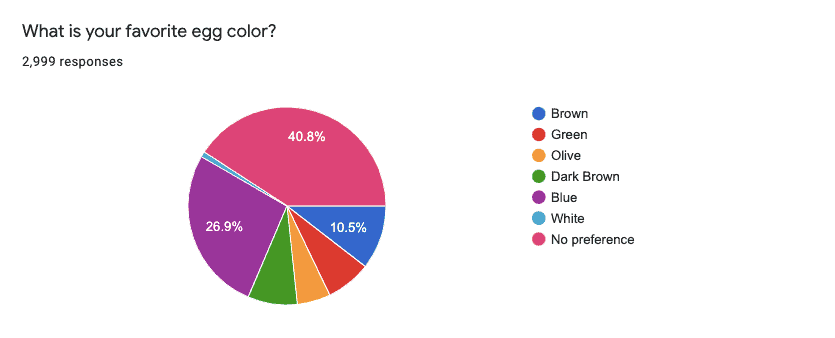
What do you primarily feed your chickens?
38% of participants feed their chickens regular pellets, and 30% use regular crumbles.
Few people choose organic, with only 8% feeding organic pellets and 7% organic crumbles.

What kind of waterer do you use for your chickens?
53% of participants use a standard waterer, and 44% use an open bowl.
Unfortunately, these two options are the worst choice for flocks because they can easily spread disease.
Chicken nipples are the best for water hygiene. However, only 27% of participants use some form of a chicken nipple.
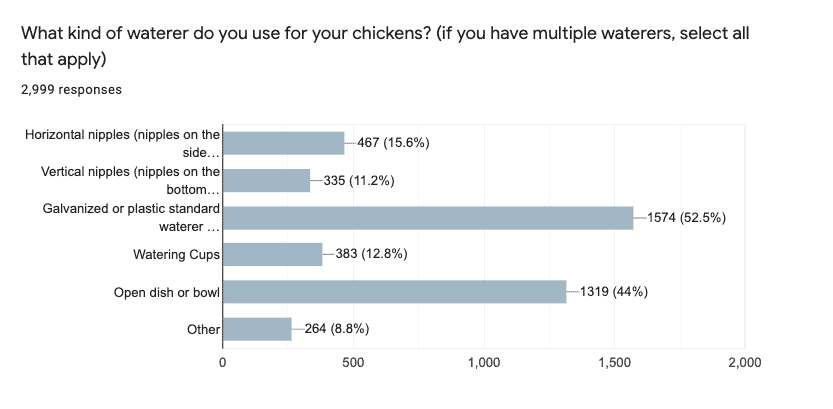
Do you allow your chickens to free-range?
Overall, 78% or participants allow their chickens to free range in some capacity.
48% of flocks free range daily, 21% a few times a week, and 10% a few times a month.
22% do not free-range their chickens.
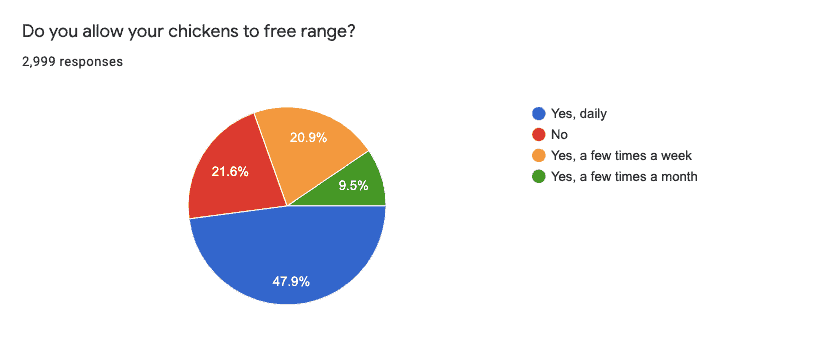
Do you heat your chicken coop with a heat lamp or heater in the winter?
A total of 79% DO NOT heat their coop, and 22% DO heat their coop.
Many chicken owners are concerned about cold temperatures and if their beloved flock will be ok. This survey shows that over half of participants DO NOT heat their coop, and their winter temperatures are at or BELOW freezing.
This is an important question for several reasons.
Heating a chicken coop is a highly debated issue. A heat source of any kind in the chicken coop is an extreme fire danger, with many chicken coops catching fire every year.
Also, heating a coop can actually cause more harm than good for the chickens. If chickens are acclimated to a warmer temperature, and there is a power failure, the sudden drop in temperature can be fatal.
However, there are also times when a heat source is needed, like with young birds or specialty breeds like silkies.
Ultimately, heating your coop is a personal decision. You can learn more about the pros and cons of heating a chicken coop and decide which is best for your flock.
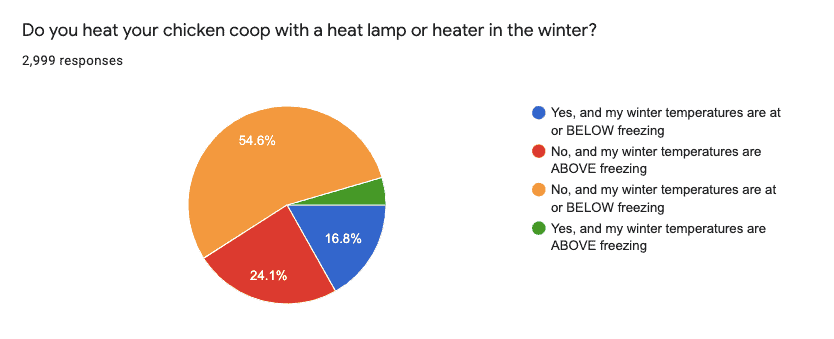
Where have you purchased or acquired chickens?
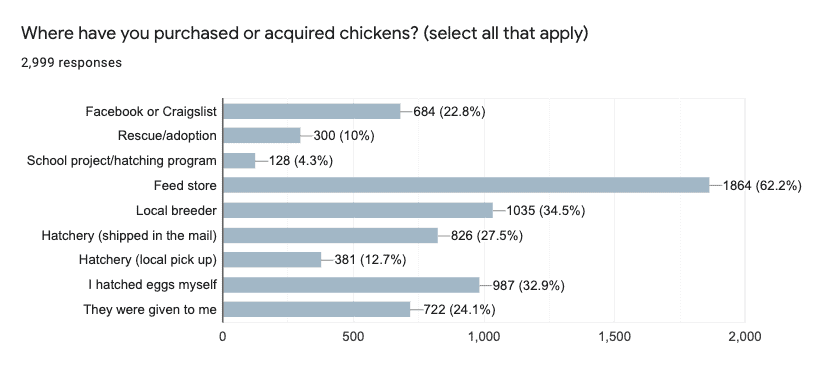
Do you plan to add more chickens in the next year?
If you have chickens, then you know all about chicken math. It is almost impossible to “settle” with the flock you have now because there are so many different kinds of chickens and pretty egg colors.
47% of participants plan to add more chickens to their flock this year.
33% said maybe. (but we all know this means “yes”)
And 20% said they wouldn’t be adding any new chickens. (I don’t believe you)
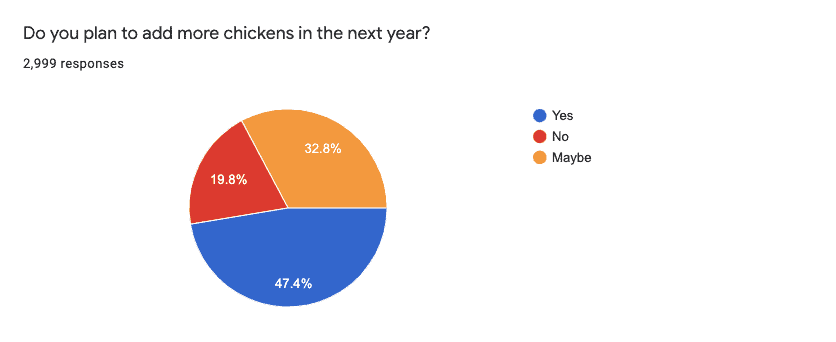
What are your long term plans for your chickens after they stop laying?
One important consideration when purchasing chickens is what will you do with them after they stop laying?
Most chicken breeds are only productive layers for 2-3 years, and after that, the number of eggs they lay decreases year after year.
This can be a challenging situation. If you are not adding new chickens, you’ll eventually have a flock of non laying chickens that need to be fed (aka freeloaders). But these are often pets with names and people that love them.
Chicken coops only have so much space, so keeping the non-layers may prevent you from adding spring chicks.
72% of participants plan to keep their chickens after they stop laying eggs, and 15% are unsure what they will do.
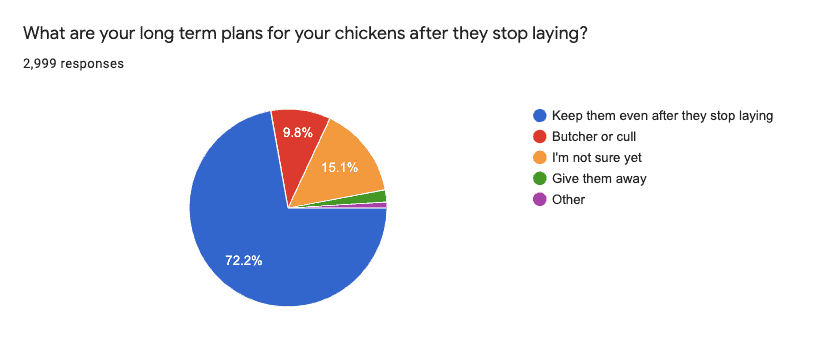
Do you have a chicken vet?
The majority of participants do not have a chicken vet. This could be due to a number of possibilities. Some folks believe that a chicken vet is not needed. For others, finding a chicken vet is hard as there are not very many. And for others that live in a rural area, it may just be too far of a drive.
Regardless of the reason, it can make things challenging when there is a sick chicken.
Having resources available before you need them can help make medical emergencies less stressful. I recommend our Backyard Chicken Health Guide: Diagnosis and Treatment ebook.

What chicken predators do you have in your area?
With the backyard chicken survey results spanning the globe, it was difficult to include every single possible chicken predator that could exist.
Out of the 18 choices on the list, Hawks were the most common chicken predator.
Hawks are an especially challenging predator because they are widespread and a federal offense to kill them.
The best way to protect free-range chickens from hawks is by having a rooster if possible and providing the chickens multiple shelters that they can hide underneath when a hawk is spotted. For those that stay confined to a run, a wire roof will keep them safe.
Preventative measures like hanging CDs or streamers won’t work in the long run, as hawks quickly get used to them.
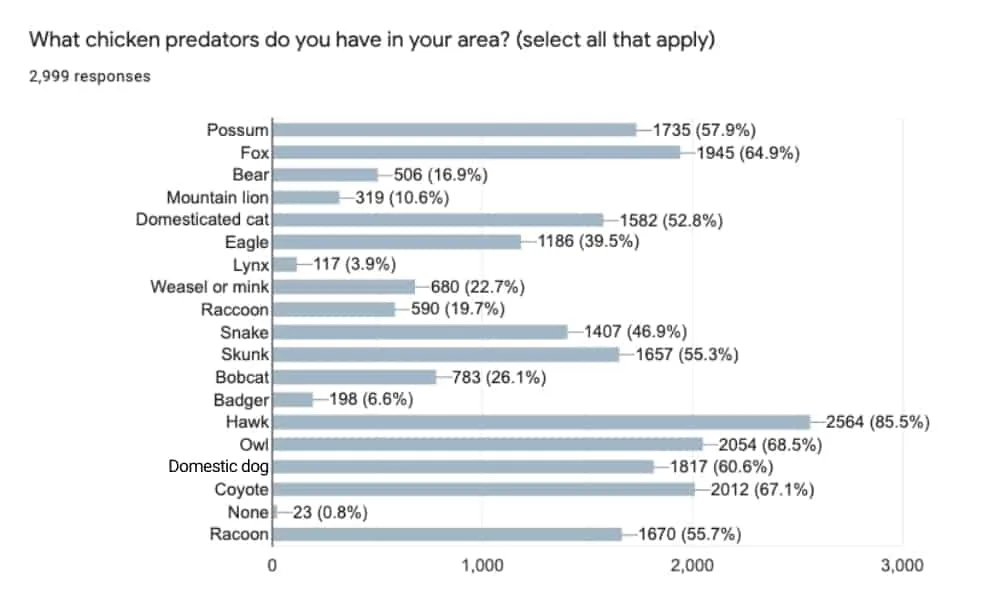
Have you experience any of the following chicken problems:
Chickens, like any livestock or pet, inevitably comes with a set of problems.
The most common problems were:
- Pooping in nest boxes 49%
- Broody hen 48%
- Bullying/pecking 46%
- Predators 42%
- Frozen water 42%
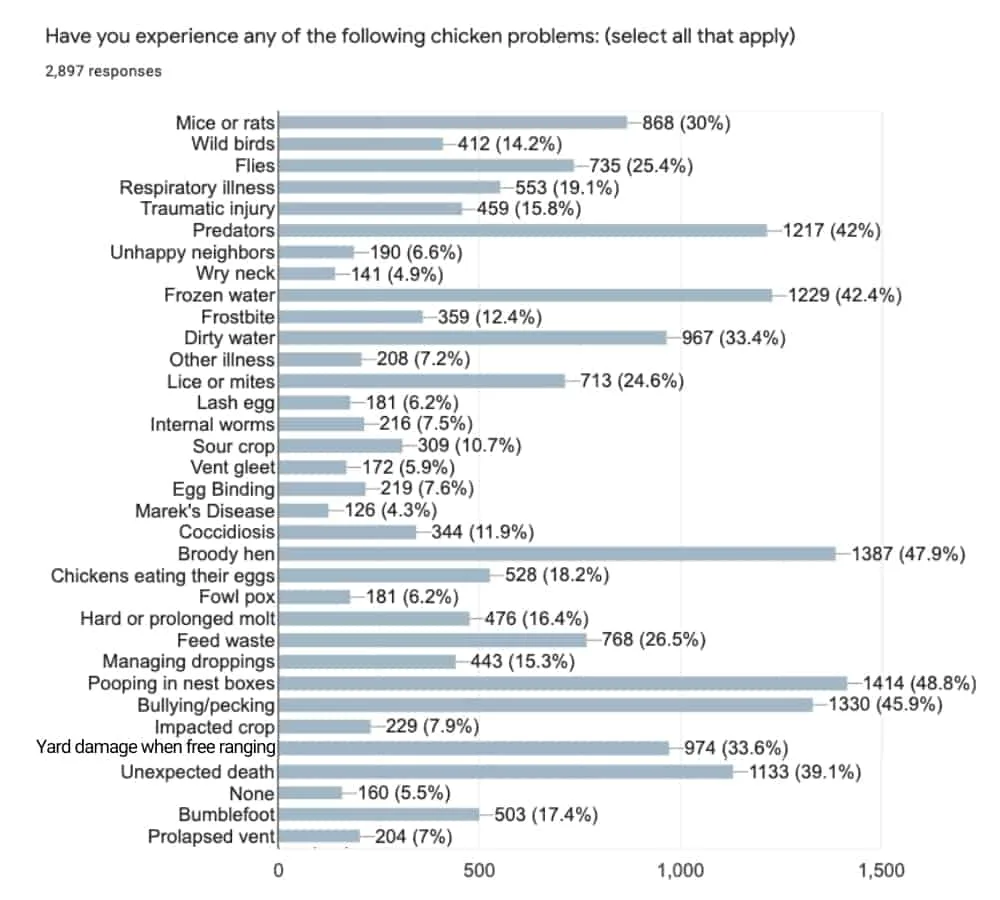
PIN THIS POST
